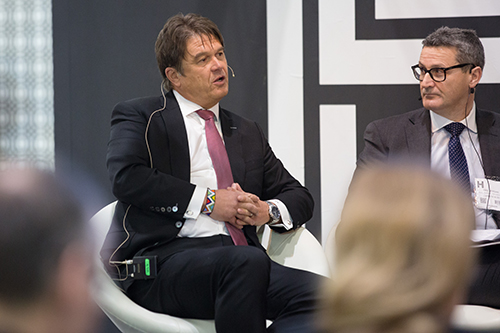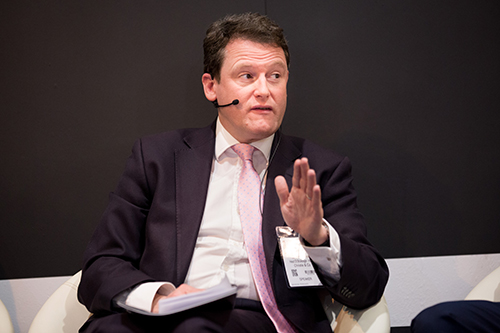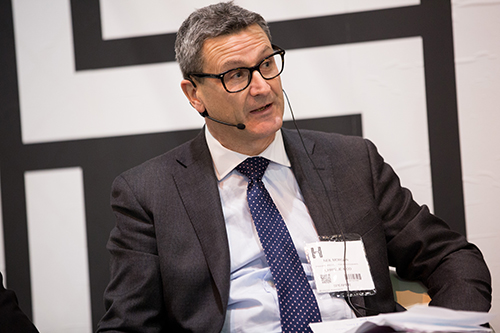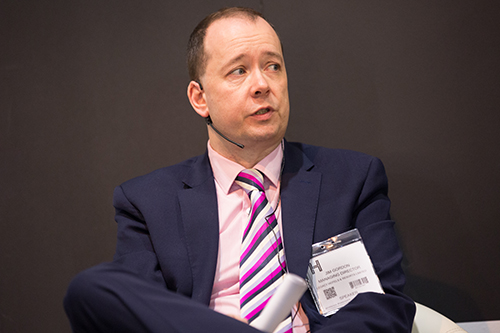The year ahead in hospitality
The Caterer invited operators and property experts Christie & Co onto the stage during Hotelympia to share their insights into what 2016 holds for hospitality. Rosalind Mullen rounds up the highlights
Any significant worries the industry has about 2016 were put to rest at Hotelympia by a panel of property experts from Christie & Co. Joining the line-up were two operators: Peter Borg-Neal, chief executive at Oakman Inns, and Jim Gordon, managing director at Legacy Hotels & Resorts.
The discussion spanned investment, regional opportunities, the impact of the National Living Wage and Brexit.
Capacity in the market
Some observers are saying there is overcapacity in the restaurant market, pointing to a slight reduction in average prices from the 2014 peak. What is the reality?
Simon Chaplin (SC):
Out of the top 10 restaurant operators with more than 100 sites, eight have changed hands in the past 18 months. But investors are now looking at groups with 20-80 sites and competition for single sites is now high, particularly in London. As the population eats out more, demand is changing. The fast-casual sector has grown the most at 7%-8%. We will continue to see entrepreneurs expand new brands.
Peter Borg-Neal
Last year, Christie & Co worked on transactions of more than £6b - £2b more than the previous year. Where are the opportunities for pubs now? And while pub closures continue, is this flattening out?
Neil Morgan (NM): We have seen a dramatic loss in pubs, down to about 49,000 from 69,000 in the 1980s. While pub closures continue, they tend to be at the bottom of the market in unenviable locations. Similarly, we saw pubs marked as 'distressed' halve in 2015, a sign that the sector is showing recovery.
The closures have left the industry with vibrant stock, which will push up pub prices. Demand for managed house stock will continue this year, but we sold one of the last sizeable managed-house portfolios [Tattershall Castle Group] last year. If you strip out the multiples, there are only 3,000 pubs to buy. We predict that there will be more sub-£20m pub group deals or mergers and acquisitions.
Peter Borg-Neal (PBN): Yes, there will be consolidation. We are interested in smaller groups. People keep on talking about the pub industry reducing, but bigger and better pubs are opening. The problem for operators like me is that finding sites is time-consuming - but it is worth the effort.
At £10b of UK transactions, 2015 was a record year from a hotel investment perspective, largely driven by the regional market. Is there oversupply in the capital?
Jeremy Jones (JJ): Hotel prices are on the up. In 2014, it was all about large transactions, with a 17.2% increase in average hotel prices year on year. In 2015, it was 9.2% (with about £10b of UK transactions). We anticipate that 2016 will be about people tidying up their portfolio, with regional transactions dominating. London remains strong, but it tends to attract trophy buyers.
Jim Gordon (JG): Our hotels are fundamentally strong. One property in Cornwall has particularly benefited, seeing 5% growth on average.
Jeremy Jones
Regional opportunities
About 70% of restaurants are independently operated and competition for single sites in London is high, which is driving values up. What opportunities are there in the regions?
SC: Manchester and Leeds are seeing more activity and this is spreading to other cities - for instance, Cardiff, Exeter and Gloucester Quays. Pressure on space means smaller market towns are seeing branded restaurants come in, with London-centred brands heading to the regions. There is also a smaller business model emerging. For instance, operators are looking for six sites of 1,500 sq ft rather than three mega-sites. But they are keeping the volume [of trade] up.
Operators may not find the same opportunities outside London as there were three years ago. We are seeing a consistent rise in rents. Rents in Manchester's Trafford Centre can be up to £100 per sq ft, but they were £30 per sq ft a few years ago.
London remains a strong home for hotel investment; however, the growth in transaction volume in 2015 has largely been driven by the regional market. Will this continue?
JJ: Hotels are seeing strong growth in Coventry, Leicester and Milton Keynes, where there is big commercial activity. There is interest from Asian buyers still and this will continue to increase. But there is a distinction: Chinese buyers arrived in 2015 to buy hotel groups. Other Asians are buying in regional UK for themselves - maybe in university towns where their children studied, or football cities because they support the local team. They are buying good-quality, workaday hotels with a good return on their capital.
Neil Morgan
Performance
Rates are rising, so can fast-casual restaurants sustain levels of 7%-8% growth?
SC: Well, consumers have evolved. For instance, La Tasca is disappearing because the quality wasn't there. But I don't think there will be any major catastrophes this year. There is low interest and low inflation. The challenge is that fast-casual is driven by the millennials, who don't want to cook, but they also spend less and want to eat when they want to eat. This is difficult for an operator to balance, so we will see more all-day dining offers.
PBN: If people don't innovate, they will have problems. The sector is vibrant, fuelled by crowd-funding, street food and so on. London is tough, though. The cost of occupancy is why I stay away.
NM: Yes, freeholds are crazy prices as you are up against affluent international buyers. Rent rises are happening, mostly in London, but also in cities such as Manchester.
Revenue per available room (revpar) has been growing steadily across hotels in London and the regions, although it slowed slightly last year at 2.7% for the capital and 6.3% elsewhere. What are your predictions?
JJ: In hotels, we predict revpar growth of 4.2% for the regional markets and 2.3% for London this year. There is continued confidence in the economy and employment market.With GDP growth expected to be 2.5%, UK consumer spending and business investment will be the main growth drivers. We will be taking hotels to market across the board. Trade looks good.
JG: Yes, we expect strong revpar growth for 2016. It is a long way off the high-water mark of 2007, but there are a lot of positives, with low food costs and strong opportunities to turn revpar into profit. Occupancy is growing. There is strong domestic demand on the leisure side. Revpar at our hotel at Corby [Hampton by Hilton] grew by 14% last year.
When I look for a new hotel, I imagine what the site would look like when it is cleared. Would I build there? Does the hotel understand its market sector? And if working with an operator or investor, we look at whether we can buy into their strategy and align.
Airbnb is a competitor, particularly in cities, but when you come up against new competition, you need to innovate. We need to make more of our advantages as hotels. For instance, use our loyalty programmes and the sense of a treat that Airbnb properties can't emulate.
Jim Gordon
The National Living Wage
The National Living Wage comes into play in April, which will mean employers have to pay workers aged over 25 at least £7.20 an hour, rising to £9 an hour by 2020. Is this too much of a jump, and what steps are being taken to mitigate its effects?
PBN: Any resistance to this is absurd. We employers need to restructure our profit and loss accounts and pay a decent wage to our staff to get the industry into a good place. We have always invested in training to give people a chance to become more skilled and build their salary.
JG: I reckon it will see our manning costs go up by 3.5%-4%, but it will make a significant change to the quality of service as we will get more out of better-motivated staff. Where possible, we may pass on the costs. We need to manage the peaks and troughs and push operators to become more efficient. It's evolution. Let's face it, there was the same outcry when the Minimum Wage was introduced.
NM: The majority of operators will find the new wage structure will increase productivity. However, it will have more of an effect on small, private operators, and they may have to increase their prices.
SC: Restaurant operators are perhaps more vulnerable because they employ more people - that said, many are young. Adding £1 to the price of a main course could help. I wonder whether customers will want to contribute so generously to service charges, though?
Good operators will be using flexible hours and noticing business peaks and troughs to manage rotas and therefore wages. The millennial's love of flexi-eating is likely to make this a bit harder for some operators to manage, though.
JJ: Anecdotally, hoteliers reckon the increased Living Wage is fine. Most accept it will be 3%-3.5% increase in costs, but this will be offset by the reduction in food and energy costs and so on.
Brexit
A recent survey revealed that two-thirds of The Caterer readers are in favour of remaining in the EU. Is that your view?
PBN: There is volatility and ambiguity in the economy at the moment, so do we want to risk it further by going into the unknown? We rely on the EU for food imports and it might affect prices. Also, we need migrant workers.
NM: No other country has left the EU yet, so it is an unknown quantity. If it causes a slide in the economy, there will be an effect on pubs - and Brexit will possibly reduce the influx of migrant workers.
JG: It could be a catastrophe for the rest of Europe, so they won't make it easy for us to leave.
JJ: Polish workers do a great job in London. At operational level, however, businesses are not concerned about the effects of Brexit on employment.
SC: If we leave, London would no doubt still be a world centre for cuisine - but the cost might change.
Simon Chaplin
Round-up
How optimistic are you about industry performance over the next few years?
SC: There are challenges, but I think the next few years will be good. There will be the emergence of more restaurant brands to satisfy the ongoing trend of people going out to enjoy themselves.
JJ: London is having a soft year to date, but it is a temporary blip. For instance, Americans don't like to travel during an election year - plus there were the recent terrorism attacks in Paris. There is a big opportunity in the regional market. Banks are lending, brands are expanding and investors are keen to buy.
JG: The UK market is positive, but there are concerns that China will end up with a hard landing. The BRIC countries have relied on commodities for their growth and they are also at risk.
NM: There were eight pub mergers last year, but this year we will see smaller, sub-£20m deals. The pubs are in demand. We have sold 6,000 pubs over recent years and fewer than 2% have changed use.
PBM: We started in 2005, have 16 pubs and have been through some tough times, but we are in a better place. There will be winners and losers this year, but we like that. It is harder to be profitable if everybody is winning. But we can't take our foot off the pedal.
How do you convince young people to work in the market?
PBN: It is about engagement. People want to feel they are making progress and getting recognition. We have worked hard at addressing that through training. Employers have individual responsibility for this. In this industry, you can push through the ranks, which is great, but we also need to recognise those with craft skills. Not everyone wants to be - or can be - a manager, but you need to reward them as their skills increase and they become more valuable to your company.
The panel
- James Stagg, deputy editor, The Caterer
- Peter Borg-Neal, chief executive, Oakman Inns & Restaurants
- Jim Gordon, managing director, Legacy Hotels & Resorts
- Neil Morgan, director and head of public houses, Christie & Co
- Simon Chaplin, director and head of restaurants, Christie & Co
- Jeremy Jones, director-head of hotels (brokerage), Christie & Co
















